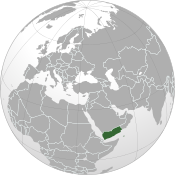US, UK embassies in Yemen close due to al-Qaeda threat
Monday, January 4, 2010
The United States and the United Kingdom closed their embassies in Yemen Sunday, pointing to ongoing terrorist threats. The closures came after the two nations pledged to boost counter-terrorism support to the Yemeni government.
The American embassy's website said the threats come from al-Qaeda in the Arabian Peninsula, the group linked to the failed Christmas Day airplane bombing attempt in the United States. The message in part said, "The U.S. Embassy in Sana’a is closed today, January 3, 2010, in response to ongoing threats by Al-Qaeda in the Arabian Peninsula (AQAP) to attack American interests in Yemen."
Further adding, "On December 31, the U.S. Embassy sent a warden message to Americans citizens in Yemen to remind them of the continuing threat of terrorist actions and violence against American citizens and interests throughout the world. The U.S. Embassy reminds U.S. citizens to maintain a high level of vigilance and to practice enhanced security awareness."
Deputy National Security Advisor for Homeland Security and Counterterrorism John O. Brennan said on CNN's State of the Union with John King, "There are indications that al Qaeda is planning to carry out an attack against a target inside of Sana'a, possibly our embassy." Brennan added, "And what we do is to take every measure possible to ensure the safety of our diplomats and citizens abroad, so the decision was made to close the embassy."
A spokesperson for the British Foreign Office said their embassy would be closed on Sunday and a decision to reopen would be made on Monday.
The closures come a day after U.S. General David Petraeus visited the capital, Sana'a, to discuss security issues with President Ali Abdullah Saleh. The general, who oversees the U.S. wars in Afghanistan and Iraq, recently announced that the United States would more than double its security aid to the impoverished nation.
The United States gave $67 million last year to Yemen, the only country that receives more aid is Pakistan with $112 million, according to the Associated Press.
Yesterday, in his weekly radio address, President Barack Obama linked the suspect in the attempted bombing of Northwest Airlines Flight 253 to al-Qaeda saying, "We know that he traveled to Yemen, a country grappling with crushing poverty and deadly insurgencies. It appears that he joined an affiliate of al-Qaeda, and that this group, al-Qaeda in the Arabian Peninsula, trained him, equipped him with those explosives and directed him to attack that plane headed for America."
Obama annouced, "So, as President, I've made it a priority to strengthen our partnership with the Yemeni government-training and equipping their security forces, sharing intelligence and working with them to strike al-Qaeda terrorists."
Obama said that they had already results prior to the Christmas Day bombing attempt saying, "So, as President, I've made it a priority to strengthen our partnership with the Yemeni government-training and equipping their security forces, sharing intelligence and working with them to strike al-Qaeda terrorists."
Britain has also announced plans to join with the United States in funding a counter-terrorism police unit in Yemen, as well as plans to hold an international conference on Yemeni security later this month.
Earlier today, British Prime Minister Gordon Brown told the BBC, "This is a new type of threat and it is from a new source which is obviously Yemen, but there are many other potential sources Somalia, as well as Afghanistan and Pakistan."
Editor Hakim Almasmari, of the Yemen Post newspaper, thinks the conference might be advantageous if it results in more development projects for rural Yemen. However, he fears what any foreign-backed military attacks could mean.
"Al-Qaeda right now is not very strong," Almasmari said. "Its followers are not more than 400 in all. However, if the U.S. does attack Yemen, al-Qaeda will get stronger and stronger because people who lose their families in the airstrikes will join al-Qaeda not because they want to but because they want revenge against the Americans and the Yemeni government for the attacks."
The situation has gained new urgency as the government in Sana'a finds itself overwhelmed not only by the growing terrorist threat, but also two separate rebellions, one of which has become something of a proxy war, at least in rhetoric, between Iran and Saudi Arabia.
U.S. military experts have warned that vast reaches of the impoverished nation, with its booming population and dwindling resources, could spin permanently out of the government's control.
Militant groups from Somalia said that they would send fighters to help aid al-Qaeda in Yemen. Yemen has vowed to keep foreign extremists out.
The U.S. embassy has faced attacks from the local al-Qaeda group before, with an assault outside its gates in 2008 that left 19 people - civilians and militants - dead.
Related news
- "Nigerian man charged with trying to blow up airliner" — Wikinews, December 27, 2009
- "Airline bombing suspect spent months in Yemen" — Wikinews, December 30, 2009
Sources
- Elizabeth Arrott. "US, British Embassies in Yemen Close Due To al-Qaida Threat" — Voice of America, January 3, 2010
- "US shuts embassy as al-Qaeda 'plans attack in Yemen'" — BBC News, January 3, 2010
- "U.S., Britain close embassies in Yemen" — CNN, January 3, 2010
- "U.S., U.K. Close Yemen Embassies" — Wall Street Journal, January 3, 2010
- "Embassy Closed in Response to Security Threat" — United States Embassy in Sana’a, Yemen, January 3, 2010
- "Weekly Address: President Obama Outlines Steps Taken to Protect the Safety and Security of the American People" — White House Office of the Press Secretary, January 2, 2010



